If you're considering adding a multivitamin to your daily routine, you might be surprised to learn about the numerous health benefits that multivitamin tablets can provide. From improving the health of your skin and hair to supporting physical performance at the gym, the benefits of taking multivitamin tablets are varied and unexpected. In this blog, we'll delve into five unexpected health benefits of multivitamin tablets, including their benefits for the skin, the benefits of taking vitamins daily, and the potential risks to consider.
Key benefits of multivitamins tablets
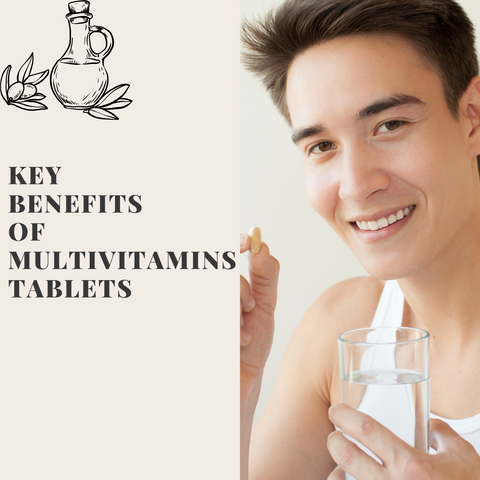
Multivitamin tablets are dietary supplements that contain a combination of essential vitamins and minerals. These supplements are designed to complement a balanced diet and provide nutrients that may be lacking in one's daily food intake. Here are key benefits associated with multivitamin tablets:
#1 Improved immune system
One of the most surprising benefits of taking multivitamin supplements is that they can help to improve your immune system. By providing your body with essential vitamins and minerals, these tablets can help to support your immune system and keep it functioning at its best. This can help to reduce your risk of getting sick, and can even help to speed up your recovery time if you do become ill.
#2 Better digestive health
Another unexpected benefit of taking multivitamin tablets is that they can help to improve your digestive health. Many of these tablets contain vitamins and minerals that are essential for maintaining healthy digestion, such as vitamin B and zinc. By taking these tablets regularly, you can help to support the healthy function of your digestive system, which can lead to improved digestion and overall health.
#3 Increased energy levels
One of the most common reasons people take multivitamin tablets is to boost their energy levels. These tablets can provide your body with the essential vitamins and minerals it needs to produce energy, which can help to improve your overall energy levels. This can be especially helpful for people who are feeling tired and sluggish, and can help to improve your overall sense of well-being.
#4 Improved mental health
Another unexpected benefit of taking multivitamin tablets is that they can help to improve your mental health. Many of these tablets contain vitamins and minerals that are essential for maintaining healthy brain function, such as vitamin B and magnesium. By taking these tablets regularly, you can help to support the healthy function of your brain, which can lead to improved mental clarity and overall well-being.
#5 Reduced risk of chronic disease
Finally, taking multivitamin tablets can help to reduce your risk of developing chronic diseases. Many of these tablets contain vitamins and minerals that are essential for maintaining good health, such as vitamin C and zinc. By taking these tablets regularly, you can help to support the healthy function of your body, which can reduce your risk of developing chronic diseases such as heart disease and diabetes.
Multivitamin tablets: Benefits for skin
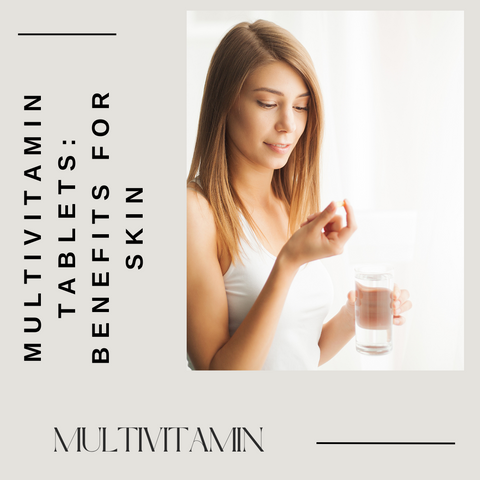
One unexpected benefit of taking skin supplements is their positive impact on the health and appearance of your skin. Vitamins A, C, and E, which are commonly found in multivitamins, have antioxidant properties that can help to protect the skin from damage caused by free radicals. In addition, vitamin C can help to promote collagen production, which can improve the elasticity and firmness of the skin. Taking a multivitamin daily may also help to reduce the appearance of fine lines and wrinkles, giving your skin a more youthful, radiant appearance. If you're concerned about the health or appearance of your skin and are interested in exploring additional ways to support its health, consider scheduling an online dermatologist consultation. At Clinikally, with the convenience of telemedicine, you can easily connect with a skin care specialist from the comfort of your own home.
Additionally, certain vitamins and minerals found in multivitamins, such as zinc and biotin, can help to improve the health of your hair and nails. Overall, incorporating a multivitamin into your daily routine may be a simple and effective way to support the health and appearance of your skin, hair, and nails.
Enhancing skin health with vitamins
Vitamins are essential for maintaining and improving skin health. These important nutrients help with a variety of skin processes, including as collagen creation, antioxidant defence, and general skin integrity. The following vitamins can assist improve skin health:
-
Vitamin A: It supports skin cell turnover, promotes a healthy complexion, and aids in the repair of damaged skin. Sweet potatoes, carrots, spinach, kale, liver, eggs, and dairy products are all good sources.
-
Vitamin C: Functions as a powerful antioxidant, promotes collagen synthesis, and protects the skin from environmental damage. Citrus fruits (oranges, lemons), strawberries, kiwi, bell peppers, broccoli, and tomatoes are all good sources.
-
Vitamin E: Benefits: A potent antioxidant that helps protect the skin from oxidative stress, supports skin hydration, and may assist in wound healing. Nuts (almonds, sunflower seeds), seeds, spinach, broccoli, and vegetable oils are all good sources.
-
Advantages of vitamin D: It is vital for immune system support, skin cell development, and overall skin health. It also facilitates the absorption of calcium. Sources include supplements, fortified dairy products, fatty fish (salmon, mackerel), and limited sun exposure.
-
Vitamin K: May lessen the appearance of dark circles under the eyes and aid in blood clotting. Fish, Brussels sprouts, and leafy greens like kale, spinach, and broccoli are some of the sources.
-
Vitamin B Complex (B1, B2, B3, B5, B6, B7, B9, B12): They are vital for the health of the skin because they promote collagen synthesis, aid in energy metabolism, and lessen inflammation of the skin. Legumes, leafy greens, dairy products, meat, poultry, fish, eggs, and whole grains.
-
Vitamin F (Essential Fatty Acids - Omega-3 and Omega-6): Benefits include reducing inflammation, preserving skin hydration, and supporting the integrity of the skin barrier. Walnuts, flaxseeds, chia seeds, fatty fish (mackerel, salmon), and vegetable oils.
-
Vitamin Biotin (Vitamin H): Biotin (Vitamin H) is found in eggs, nuts, seeds, sweet potatoes, and organ meats. It is necessary for healthy skin, hair, and nails.
-
Vitamin Niacin (B3): Promotes skin barrier function, reduces redness, and may aid in acne management. Meat, poultry, fish, peanuts, mushrooms, and avocados are all good sources.
-
Vitamin Riboflavin (B2): Promotes skin health, aids in collagen maintenance, and may protect against oxidative stress. Dairy products, lean meats, green leafy vegetables, and eggs are all good sources.
While getting these vitamins from a balanced diet is preferable, supplements may be necessary in some cases to address specific deficiencies or to maintain overall skin health. However, before beginning any new supplement programme, contact with a healthcare expert, since excessive intake of some vitamins might be harmful. Other habits, such as being hydrated, protecting your skin from the sun, and following a consistent skincare routine, can help to maintain and improve skin health in addition to including these vitamins in your diet.
Role of vitamins in skin aging
Vitamins have a considerable impact on the ageing process of the skin. Skin ageing is a complicated process that is impacted by both intrinsic (genetic) and extrinsic (environmental) variables. Various vitamins help to maintain healthy skin and can help to reduce the symptoms of ageing. Here's a breakdown of major vitamins' roles in skin ageing:
-
Vitamin A, as well as its derivatives such as retinol and retinoids, greatly aids collagen synthesis and skin cell turnover. It lessens the visibility of wrinkles and fine lines and helps keep skin supple. liver, eggs, leafy greens, sweet potatoes, and carrots.
-
As a strong antioxidant, vitamin C aids in shielding the skin from oxidative stress brought on by free radicals. It brightens the complexion, encourages skin elasticity, and supports the synthesis of collagen. Broccoli, bell peppers, strawberries, kiwi, oranges, and lemons are examples of citrus fruits.
-
Vitamin E is a potent antioxidant that aids in shielding the skin from harm brought on by free radicals. It promotes skin hydration and lessens the visibility of fine wrinkles. Vegetable oils, seeds, spinach, and nuts (almonds, sunflower seeds).
-
Vitamin D is necessary for overall skin health and immune system support. Adequate vitamin D levels may aid in the prevention of premature ageing. Sunlight, fatty fish (salmon, mackerel), and fortified dairy products are all beneficial.
-
Vitamin K aids in blood clotting and may help to reduce the appearance of dark circles under the eyes. It promotes general skin health. Leafy green vegetables (kale, spinach, broccoli), Brussels sprouts, and fish are all good choices.
-
B-vitamins promote overall skin health, aid in energy metabolism, and aid in the reduction of skin inflammation. They aid in the maintenance of healthy skin, hair, and nails. Meat, poultry, fish, eggs, leafy greens, and legumes are all good sources of fibre.
-
Essential fatty acids (omega-3 and omega-6) found in vitamin F help to maintain hydration and minimise the appearance of fine lines by supporting the lipid barrier of the skin. Fatty fish (salmon, mackerel), flaxseeds, chia seeds, and walnuts.
-
The vitamin biotin, also known as vitamin H, is necessary for strong nails, hair, and skin. It helps preserve the health of the skin and can enhance the look of ageing skin. Sweet potatoes, organ meats, nuts, seeds, and eggs.
-
Vitamin B3, niacinamide, lowers redness, keeps skin barrier function intact, and may help with the look of ageing skin. Meat, poultry, fish, avocados, peanuts, and mushrooms.
-
Riboflavin promotes overall skin health by assisting in the maintenance of collagen levels, which are essential for skin structure. Dairy products, lean meats, green leafy vegetables, and eggs.
While these vitamins can help to maintain healthy and youthful skin, it's vital to remember that a holistic approach to skincare includes a well-balanced diet, UV protection, hydration, and a consistent skincare routine. Furthermore, individual sensitivities to vitamins may differ, and excessive intake of some vitamins should be avoided since it may have negative consequences. Consultation with a healthcare expert or dermatologist can provide tailored recommendations based on your specific skin needs and problems.
Multivitamin tablets: Benefits for hair growth
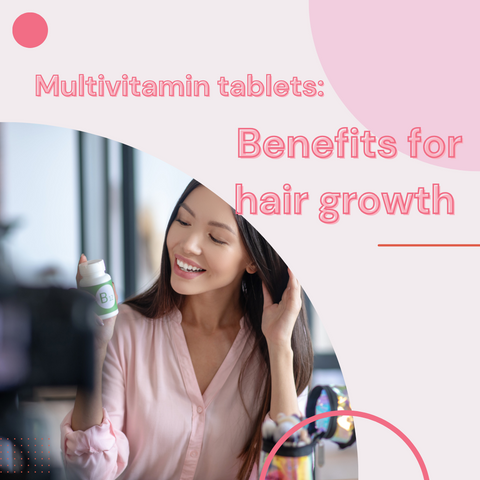
Taking a multivitamin tablets for hair growth can have numerous benefits for your hair, including promoting healthy growth and preventing hair loss. Many multivitamins contain essential nutrients such as biotin, vitamins A and C, and zinc, which are important for maintaining strong and healthy hair. Hair growth supplements may also include a targeted blend of nutrients specifically formulated to support optimal hair health. By incorporating a daily multivitamin into your routine along with a hair regrowth serum, you can give your hair deep nourishment and promote hair growth.
Vitamins for stronger hair
Several vitamins are important in producing stronger and healthier hair. Hair strength, thickness, and overall vitality can be improved with adequate diet and care. The following are essential vitamins that promote healthier hair:
-
Sebum is a natural oil that keeps the scalp and hair hydrated. Vitamin A supports the production of sebum. Sweet potatoes, carrots, spinach, kale, and liver are all examples of vegetables.
-
Vitamin E is an antioxidant that protects hair follicles from oxidative stress and promotes healthy hair growth. Nuts, seeds, spinach, and vegetable oils (almonds, sunflower seeds).
-
Collagen is necessary to keep hair structure intact, and vitamin C supports its production. Broccoli, bell peppers, strawberries, kiwi, oranges, and lemons are examples of citrus fruits.
-
Hair follicle health and potential prevention of hair shedding are enhanced by vitamin D. Sun exposure, fatty fish (salmon, mackerel), fortified dairy products.
-
Biotin promotes healthy hair growth and helps stop hair loss. Vitamin B5, also known as pantothenic acid, helps to prevent hair thinning and encourages hair growth. The synthesis of haemoglobin, which transports oxygen to hair follicles, is aided by vitamin B6 (pyridoxine). B12 (Cobalamin) Supports hair cell production and helps prevent hair loss. B6: Chicken, fish, bananas; B12: Meat, fish, dairy products; biotin: Eggs, nuts, seeds; B5: Meat, avocados, whole grains.
-
Vitamin K promotes healthy hair by increasing blood circulation to the scalp. Leafy green vegetables (kale, spinach, broccoli), Brussels sprouts, and fish are all good choices.
-
Vitamin F, which is made up of the essential fatty acids omega-3 and omega-6, reduces inflammation on the scalp to support healthy hair growth. Walnuts, chia seeds, flaxseeds, and fatty fish (salmon, mackerel).
-
Iron is necessary for the healthy growth of hair by delivering oxygen to the follicles. Fish, poultry, lentils, beans, red meat, and fortified cereals.
-
Hair follicle health is enhanced by zinc, which may also help stop hair loss. Seafood, nuts, seeds, legumes, and meat.
-
Melanin, the pigment that gives hair its colour, is produced with the help of copper. Whole grains, nuts, seeds, shellfish, and organ meats.
It's critical to eat a well-balanced diet full of nutrient-rich foods to ensure you obtain a variety of vitamins and minerals for overall health, including hair health. If you are concerned about hair loss or changes in hair quality, you should seek personalised advice and treatment from a healthcare practitioner or dermatologist. Additionally, avoid using too many vitamins, since this can have negative consequences.
Preventing hair loss with vitamins
While genetics, hormonal changes, and medical conditions all contribute to hair loss, incorporating certain vitamins into your diet may help promote healthy hair growth and reduce the risk of hair loss. Here are some vitamins that are known to help prevent hair loss:
- Biotin (Vitamin B7) is well known for promoting healthy hair, skin, and nails. It is required for the breakdown of amino acids, the building blocks of protein. Good sources include eggs, nuts, seeds, sweet potatoes, and organ meats.
- Iron is required for the transport of oxygen to hair follicles. Hair loss can be caused by iron deficiency (anaemia). Good sources include red meat, poultry, fish, lentils, beans, and fortified cereals.
- This mineral may help stop hair loss by supporting the health of hair follicles. Zinc deficiency has been connected to hair loss. Meat, shellfish, legumes, seeds, and nuts are all good sources.
- Vitamin D plays an important role in maintaining healthy hair follicles.Low vitamin D has been connected to hair loss. Sun exposure (limited), fatty fish (salmon, mackerel), fortified dairy products.
- Antioxidant vitamin E protects hair follicles from oxidative stress, promoting healthy hair growth. Vegetable oils, seeds, spinach, and nuts (almonds, sunflower seeds) are examples of sources.
-
Sebum is a naturally occurring oil that keeps the hair and scalp hydrated. Vitamin A helps maintain this oil production. Liver, spinach, kale, carrots, and sweet potatoes are among the sources.
-
This action encourages the production of collagen, a crucial structural element of hair. Its antioxidant properties are also present. Citrus fruits (lemons and oranges), bell peppers, strawberries, kiwis, and broccoli are just a few of the foods that contain it.
-
The purpose of these vital fatty acids is to lessen inflammation, support healthy scalp function, and possibly even stop hair loss. Walnuts, flaxseeds, chia seeds, and fatty fish (salmon, mackerel) are some of the sources.
- Numerous B-vitamins improve amino acid metabolism, promote overall healthy hair, and may even be able to stop hair loss. In addition to whole grains, sources include leafy greens, legumes, meat, chicken, fish, and eggs.
- Melanin, the pigment that gives hair its colour, aids in its creation. Nuts, seeds, seafood, organ meats, and whole grains are all good sources.
While these vitamins can be beneficial, a well-balanced diet rich in nutrient-dense foods is essential. Furthermore, if you are experiencing significant hair loss, seek the assistance of a healthcare professional or dermatologist for a thorough evaluation and customised treatment.
Multivitamin tablets: side effects
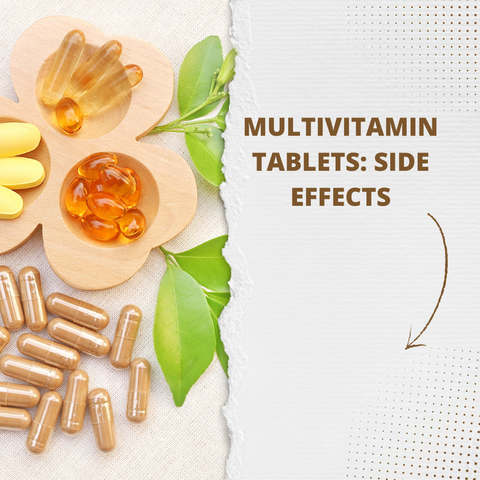
While multivitamin tablets can provide numerous health benefits, it is important to be aware of the potential side effects. Some people may experience digestive issues such as nausea, bloating, or diarrhea when taking multivitamins, especially if they are taken on an empty stomach. In rare cases, multivitamins can cause allergic reactions or interact with certain medications. It is always a good idea to speak with a healthcare professional before starting any new supplement, including multivitamin tablets, to ensure they are safe and appropriate for you.
Understanding and managing potential side effects
Understanding and controlling potential side effects of any prescription or supplement, including vitamins, is critical. Here are some broad tips for dealing with any adverse effects:
-
Understand the Common Side Effects: Educate yourself on the common side effects of the vitamins or supplements you are taking. Common side effects are frequently mild and transient.
-
Dosage is Important: Follow the directions on the label. Excessive consumption of certain vitamins or minerals can have negative consequences. Take note of the Recommended Dietary Allowances (RDAs) or Adequate Intakes (AIs) for various age groups and genders.
-
Take along with food: Some vitamins are more easily absorbed when consumed with food. Taking them on an empty stomach may increase the likelihood of experiencing digestive issues. Consult a healthcare professional or follow the directions on the supplement label.
-
Consider Timing: Pay attention to when you take your vitamins. Some vitamins may be better absorbed at different times of the day. Fat-soluble vitamins (A, D, E, and K, for example) are frequently better absorbed with fat-containing meals.
-
Beware of Interactions: Some vitamins and minerals can interact with medications or other supplements you may be taking. To avoid potential interactions, inform your healthcare provider about all supplements and medications you are taking.
-
Stay Hydrated: Drinking plenty of water is essential, especially when taking vitamins or supplements. It can help prevent constipation, which is sometimes associated with certain supplements.
-
Keep an eye out for Allergic Reactions: Keep an eye out for any indications of an allergic reaction, such as swelling, itching, or breathing difficulties. Seek immediate medical attention if you encounter these symptoms.
-
Gradual Introduction: If you are adding a new supplement to your regimen, think about lowering the dosage at first and then raising it bit by bit. By doing this, you can lessen the possibility of any negative effects and help your body adjust.
-
Speak with a Healthcare Professional: See a healthcare provider before beginning any new supplement regimen, particularly if you take medication or have underlying medical conditions. Based on possible interactions and your current state of health, they can offer you tailored advice.
-
Be Aware of Warning Signs: Become familiar with any warning indicators that might point to an overdose or serious reaction. They might consist of extreme nausea, vomiting, lightheadedness, or other peculiar symptoms.
-
Think About Natural Sources: Try to get your vitamins and minerals from natural food sources whenever you can. The best way to meet your nutritional needs is with a diet that is well-balanced.
-
Frequent Health Check-ups: Make time for routine health check-ups so you can talk to your healthcare provider about your supplement regimen. They are able to evaluate your general health and make any necessary corrections.
Keep in mind that everyone reacts differently to supplements. If you develop persistent or severe negative effects, stop taking the supplement and seek medical attention right away. Prioritise your health and well-being at all times, and make educated decisions based on competent advice.
Boost your health with multivitamin pills!
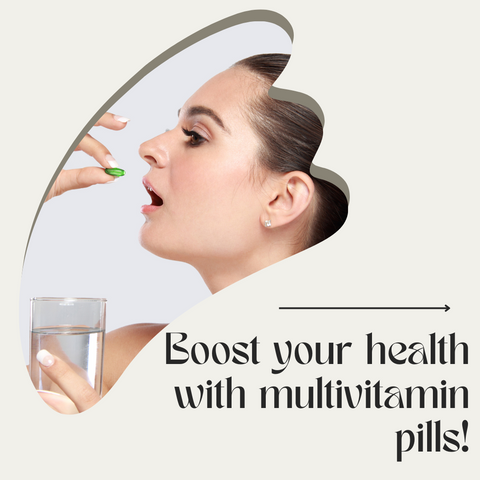
In conclusion, taking multivitamin pills can provide a range of unexpected health benefits. From improved immune function and better digestive health, to increased energy levels and improved mental health, these tablets can help to support your overall health and well-being. So, if you're looking to improve your health and well-being, consider adding multivitamin tablets to your daily routine.
Types of Multivitamins
Multivitamins are a popular supplement that can help people ensure they are getting all the essential vitamins and minerals their body needs. There are several different types of multivitamins available, each designed to meet the unique needs of different groups of people. The following table provides an overview of the different types of multivitamins and their key characteristics.
|
Type of Multivitamin |
Description |
Vitamin Types |
|
General Multivitamins |
Contains a blend of essential vitamins and minerals that are commonly found in a healthy diet. These are suitable for most people and can help fill in any nutritional gaps in their diet. |
Water-soluble and fat-soluble vitamins |
|
Specialty Multivitamins |
Designed for specific groups of people, such as pregnant women, senior citizens, or athletes. These multivitamins may contain higher or lower amounts of certain vitamins and minerals based on the needs of the target group. |
Water-soluble and fat-soluble vitamins |
|
Therapeutic Multivitamins |
Intended for the treatment of a specific deficiency or health condition. These multivitamins may contain higher amounts of certain vitamins and minerals and may be prescribed by a healthcare provider. |
Water-soluble and fat-soluble vitamins |
|
Customized Multivitamins |
Formulated based on an individual's unique nutritional needs, which may be determined through a blood test or other means. These multivitamins may contain different amounts of various vitamins and minerals than those found in general or specialty multivitamins. |
Water-soluble and fat-soluble vitamins |
When selecting a multivitamin, keep your unique health needs, dietary choices, and any underlying health concerns in mind. Furthermore, talking with a healthcare practitioner can assist ensure that the multivitamin you choose is appropriate for your specific circumstances.
Personalizing your multivitamin choice
Personalising your multivitamin selection is critical to ensuring that you are meeting your unique nutritional needs depending on age, gender, health condition, eating habits, and lifestyle. Here are some things to think about while choosing a multivitamin:
-
Age and Gender: Different life stages and genders have different nutritional needs. There are multivitamins specifically designed for males, women, seniors, and children. To address specific nutritional needs, choose a multivitamin that is appropriate for your age and gender.
-
Health Goals: When selecting a multivitamin, keep your health goals in mind. For example, if you want to boost your immune system, you might prioritise vitamins C and D. A multivitamin containing calcium and vitamin K may be advantageous if bone health is a problem.
-
Dietary Restrictions: Choose a multivitamin that complements your eating habits if you have dietary restrictions or follow a specialised diet. If you follow a vegetarian or vegan diet, for example, seek for plant-based multivitamins that do not contain animal-derived substances.
-
Nutrient Requirements: Determine your nutrient needs. If you have deficiencies or are at risk of having deficiencies (for example, vitamin D inadequacy), you should take a multivitamin that addresses those needs.
-
Medical Conditions: Take into account any medical issues you may have. Certain medical problems can interfere with nutritional absorption or raise the need for certain vitamins and minerals. Consult your healthcare professional to see if a specialised multivitamin is necessary.
-
Quality and Purity: Select a multivitamin from a recognised brand that meets quality and purity requirements. To guarantee that the product fits the claimed requirements, look for third-party testing and certifications.
-
Form and Absorption: Consider the vitamin and mineral form of the multivitamin. Some types are more easily absorbed by the body. Methylated versions of B vitamins, for example, may be desirable for those who have particular genetic variants that impact B vitamin metabolism.
-
Additives and Fillers: Examine the multivitamin for superfluous additions, fillers, or allergies. Choose a formulation that is free of common allergens if you have sensitivities or allergies.
-
Dosage and Frequency: Examine the multivitamin dosage and frequency. Some people prefer once-daily dosages, while others prefer split doses. Consider what is practical and convenient for your daily schedule.
-
Personal Preferences: Consider your own preferences, such as supplement type (capsules, pills, gummies), flavour, and if you want a multivitamin with or without extra herbs or botanicals.
-
Consult with a Healthcare Professional: Consult a healthcare expert before beginning any new supplement regimen, especially if you have underlying health concerns or take medications. They can give you personalised recommendations based on your current health situation.
Remember that a multivitamin should supplement, not replace, a healthy and balanced diet. While multivitamins are useful, getting your nutrients from a range of whole meals is the best approach to meet your nutritional needs. Reevaluate your multivitamin selection on a regular basis based on changes in your health, lifestyle, or dietary habits.

















2 comments
Health Veda Organics
Health Veda Organics Multivitamin Tablets with Probiotics supplements may help increase energy, and stamina levels, enhance nervous and immune systems, improve vision, and improve antioxidant capabilities. These multivitamin tablets are with herbs, vitamins, and minerals that boost your immunity.
Health Veda Organics Multivitamin Tablets with Probiotics supplements may help increase energy, and stamina levels, enhance nervous and immune systems, improve vision, and improve antioxidant capabilities. These multivitamin tablets are with herbs, vitamins, and minerals that boost your immunity.
Ajay
Thank you for sharing this informative article; it will really help us.
Thank you for sharing this informative article; it will really help us.